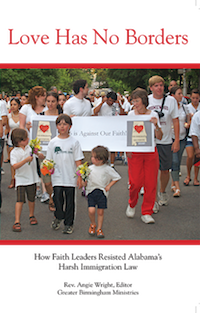By Jeff Brumley
It took about a year of legal action, preaching, public demonstrations and letter writing for religious groups to see most of Alabama’s draconian anti-immigrant law overturned.
Now that coalition of faith — which includes Baptists, Catholics, Episcopalians and many others — is sending the message to religious leaders in other states: be prepared to organize, agitate and sometimes even suffer on behalf of “the least of these.”
That warning comes in the form of a new book titled Love Has No Borders, compiled in part to prepare and inspire religious communities to oppose harsh anti-immigration policies like the law, known as HB 56, approved by the Alabama legislature in June 2011.
“It’s about the faith community taking a stand with people who were being hurt and … it’s a memoir of what happened and a challenge for people to do more,” said editor and contributor Angie Wright, pastor of Beloved Community United Church of Christ and associate director of Greater Birmingham Ministries. “It’s a challenge for faith leaders to continue to stand with people being hurt.”

The book, released in September, collects news releases, newsletter articles, sermons, prayers, blog posts, newspaper guest columns and letters to the editor written by lay and clergy members from across the denominational spectrum. A rabbi also is a contributor and submissions come from every corner of the state.
Fisher Humphreys, professor emeritus of divinity at Samford University, helped Wright organize the book and get it published. He especially urged moderate Baptists across the nation to be on guard for moves by conservatives to seek harsh measures against undocumented immigrants.
“It would be well if other states learned the lesson we learned here in Alabama,” said Humphreys, who also blogged about the book for ABPnews.
‘Make us felons’
It all started with dozens of deadly tornadoes tearing through the state in the spring of 2011. While Alabamians were still reeling from the storms, the Republican governor and Republican-dominated Legislature passed HB 56.
The law said “illegal immigration is causing economic hardship and lawlessness in this state” and therefore made it illegal, even for church workers and volunteers, to transport or in any other way knowingly aid undocumented aliens. It also sought to make public institutions, including schools and colleges, enforcers of the law.
Supporters were open about its intent: to scare immigrants into leaving the state or never coming to Alabama in the first place.
“This bill is designed to make it difficult for them to live here so they will deport themselves,” bill sponsor Rep. Micky Hammon, R-Decatur, told fellow legislators according to a Birmingham News blog. The measure “attacks every aspect of an illegal alien’s life.”
Alabama Congressman Mo Brooks vowed that he would “do anything short of shooting them” to push undocumented immigrants from the state.
In that atmosphere, religious leaders felt under the gun simply in operating traditional ministries that “would make us felons, which would give us 10 years in prison and a $15,000 fine.”
It was those stipulations in the law that prompted Catholic, Episcopal and Methodist leaders to file suit, claiming their religious right to help the neediest in society were being violated, Wright said.
“It was inspiring seeing these bishops file a lawsuit against the state and Gov. (Robert) Bentley,” she said.
A grassroots, ecumenical and interfaith campaign grew up in the ensuing months, with lay and clergy leadership alike taking often difficult political and social stands against legislation that was largely supported by conservative Christians in Alabama, Wright said.

One risk was by submitting letters to newspapers. In one of them, Ellin Jimmerson appealed to Gov. Bentley and to legislators to repeal the law because of the suffering it generates for immigrants and citizens alike.
Jimmerson, minister to the community at Weatherly Heights Baptist Church in Huntsville, compared the immigration measure to the way Rome and ancient Egypt often treated religious minorities.
“You know you are being reckless with other people’s lives,” Jimmerson said in the letter that is included in the book. “I am asking you to convene a special session, honor the God whom you say you worship, and repeal HB56.”
‘Baptists often forget’
Humphreys said he was impressed by the dedication Jimmerson and other faith leaders in the state displayed against the measure — though initially he didn’t think it was necessary.
“It was slow dawning on me that this was an issue that people needed to speak out on,” he said. “My initial reaction was that the courts are going to strike this down.”
Once he did catch on, Wright was already compiling the writings for her book and he offered to jump in, both as a member of the board of Greater Birmingham Ministries and as one experienced in getting books published.

Humphreys said he was touched by the struggle against HB 56 in part because he is a Baptist, too.
“In the past, Baptists were themselves a minority group and a despised group,” he said. “Baptists often forget they were a despised minority” just as undocumented aliens are today in the United States.
He urged Baptists to lead the way against harsh anti-immigrant movements and laws that “are trying to stop us from doing the ministries that we as Christians are called to do.”
Love Has No Borders demonstrates that such attitudes and faith can lead to results, Wright said.
Inspired by the consistent ecumenical opposition to the law, protests were being staged at the statehouse and elsewhere through the state. By late 2012, most of the teeth of the law had been removed through litigation.
But it took risk, Wright said.
“It’s a scary thing and there are costs involved,” she added. “It’s an invitation to faith leaders — not just clergy — to see that your life is so enriched when you are willing to live in solidarity with the poor,” she said.
